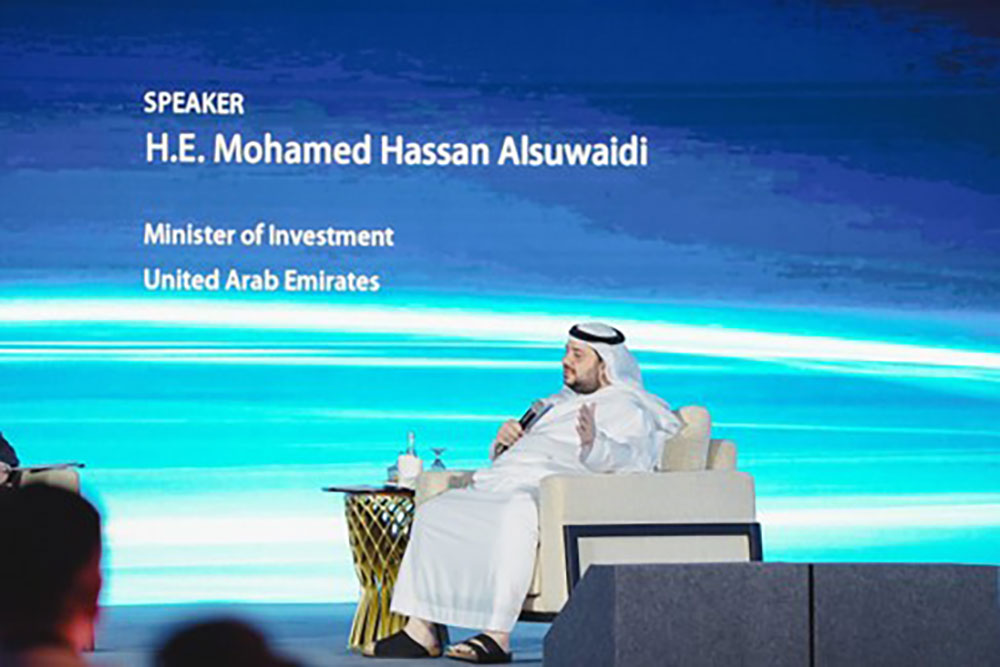
美国和中国展开人工智能军备竞赛之际,阿拉伯联合酋长国(阿联酋)却在两个超级大国之间选择了中立,这一立场有望坐收渔利。周三在马来西亚举行的《财富》东盟-海湾阿拉伯国家合作委员会经济论坛(Fortune’s ASEAN-GCC Economic Forum)上,阿联酋投资部长穆罕默德·哈桑·阿尔苏瓦迪表示,正努力将外国投资翻倍,同时在非洲和东南亚等被忽视的地区大规模投资基础设施。
尽管该地区有数十亿美元资金流动,阿联酋的全球影响力也不断扩大,但阿尔苏瓦迪表示自己的职责很简单。“努力为我们的投资者争取最优条件,也为外来投资者争取合适的交易,”他在接受《财富》采访时说道。
煎小鱼
阿联酋拥有10个主权财富基金以及两个养老基金,相当热衷于国际投资,尤其在数据中心和全球科技初创企业领域表现活跃。身兼阿联酋投资部长及最大主权基金之一ADQ首席执行官的阿尔苏瓦迪,正是这场资本盛宴的核心人物。
阿尔苏瓦迪长期在阿联酋投资领域工作,曾在另一家领先的主权财富基金穆巴达拉投资公司担任高管。如今正逢人工智能发展的关键节点,阿尔苏瓦迪执掌着阿联酋两大顶级机构。
周三他在讲话表示,美国和中国在人工智能方面的做法是“煮大海”,因为OpenAI和DeepSeek等公司都拥有庞大资源构建大型语言模型,消耗海量数据和能源。用他的话说,阿联酋这样的小国则应该采取“煎小鱼”战术。
阿尔苏瓦迪认为,阿联酋可将人工智能专门应用于特定的国内场景,例如完善护照和许可系统,从而争取更精准的突破。“对小国而言,人工智能很容易发挥优势,”他说。
更不用说该国庞大的投资实力。仅ADQ一家公司就曾投资苏富比拍卖行和物流公司Aramex等公司,过去四年资产翻了一番以上。但阿尔苏瓦迪表示,ADQ希望加大投资发展中国家的基础设施,特别是能源和人工智能发展领域。“我们经常遇到机会与实际情况并不匹配的困境。”他指出,考虑到风险因素,在非洲、东南亚和拉美等地区寻找投资机会挑战很大。
随着对人工智能的需求不断增长,美国和中国公司不断扩大竞争优势,阿尔苏瓦迪表示在全球建设数据中心可促进资源合理分配。“不仅要开发人工智能,也要关注获取人工智能服务的便利性,”他说道。
阿联酋已成为全球能源开发领域的最大投资国,涵盖可再生能源和核能等。至于有人担心大规模建设能源基础设施可能引发泡沫,阿尔苏瓦迪不以为然。“如果真想参与人工智能竞赛,必定会消耗大量电力和能源,”他说。
“感觉超级大国并没有甩开我们很多,”他补充道。(财富中文网)
译者:梁宇
审校:夏林
美国和中国展开人工智能军备竞赛之际,阿拉伯联合酋长国(阿联酋)却在两个超级大国之间选择了中立,这一立场有望坐收渔利。周三在马来西亚举行的《财富》东盟-海湾阿拉伯国家合作委员会经济论坛(Fortune’s ASEAN-GCC Economic Forum)上,阿联酋投资部长穆罕默德·哈桑·阿尔苏瓦迪表示,正努力将外国投资翻倍,同时在非洲和东南亚等被忽视的地区大规模投资基础设施。
尽管该地区有数十亿美元资金流动,阿联酋的全球影响力也不断扩大,但阿尔苏瓦迪表示自己的职责很简单。“努力为我们的投资者争取最优条件,也为外来投资者争取合适的交易,”他在接受《财富》采访时说道。
煎小鱼
阿联酋拥有10个主权财富基金以及两个养老基金,相当热衷于国际投资,尤其在数据中心和全球科技初创企业领域表现活跃。身兼阿联酋投资部长及最大主权基金之一ADQ首席执行官的阿尔苏瓦迪,正是这场资本盛宴的核心人物。
阿尔苏瓦迪长期在阿联酋投资领域工作,曾在另一家领先的主权财富基金穆巴达拉投资公司担任高管。如今正逢人工智能发展的关键节点,阿尔苏瓦迪执掌着阿联酋两大顶级机构。
周三他在讲话表示,美国和中国在人工智能方面的做法是“煮大海”,因为OpenAI和DeepSeek等公司都拥有庞大资源构建大型语言模型,消耗海量数据和能源。用他的话说,阿联酋这样的小国则应该采取“煎小鱼”战术。
阿尔苏瓦迪认为,阿联酋可将人工智能专门应用于特定的国内场景,例如完善护照和许可系统,从而争取更精准的突破。“对小国而言,人工智能很容易发挥优势,”他说。
更不用说该国庞大的投资实力。仅ADQ一家公司就曾投资苏富比拍卖行和物流公司Aramex等公司,过去四年资产翻了一番以上。但阿尔苏瓦迪表示,ADQ希望加大投资发展中国家的基础设施,特别是能源和人工智能发展领域。“我们经常遇到机会与实际情况并不匹配的困境。”他指出,考虑到风险因素,在非洲、东南亚和拉美等地区寻找投资机会挑战很大。
随着对人工智能的需求不断增长,美国和中国公司不断扩大竞争优势,阿尔苏瓦迪表示在全球建设数据中心可促进资源合理分配。“不仅要开发人工智能,也要关注获取人工智能服务的便利性,”他说道。
阿联酋已成为全球能源开发领域的最大投资国,涵盖可再生能源和核能等。至于有人担心大规模建设能源基础设施可能引发泡沫,阿尔苏瓦迪不以为然。“如果真想参与人工智能竞赛,必定会消耗大量电力和能源,”他说。
“感觉超级大国并没有甩开我们很多,”他补充道。(财富中文网)
译者:梁宇
审校:夏林
While the U.S. and China wage an AI arms race, the United Arab Emirates is taking a neutral position between the two global superpowers—a key position where it stands to reap the profits. Speaking at Fortune’s ASEAN-GCC Economic Forum in Malaysia on Wednesday, UAE Minister of Investment Mohamed Hassan Alsuwaidi said that his country is seeking to double the foreign investment coming into the country while making its own large infrastructure bets on overlooked regions, including Africa and Southeast Asia.
Even as the UAE’s global footprint swells, driven by the billions of dollars flowing into and out of the region, Alsuwaidi said his role was simple. “I’m trying to get the best deals for my investors, and the other is trying to get the best deals for investors who are coming to the UAE,” he told Fortune’s Clay Chandler.
Frying the fish
With 10 sovereign wealth funds, along with two pension funds, the UAE serves as a hotbed for international investment, especially through its active role in financing data centers and tech startups around the world. Alsuwaidi sits at the center of this frenzy of activity in his dual role as the UAE’s investment minister and CEO of ADQ, one of the country’s largest sovereign wealth funds.
Alsuwaidi has long worked in the UAE’s investment scene, including as a former executive at Mubadala, another leading sovereign wealth fund in the country. But now, Alsuwaidi has taken the helm of two of the country’s top institutions at a crucial juncture in AI development.
Speaking on Wednesday, he said that the approach of the U.S. and China has been to “boil the ocean” when it comes to AI, as companies like OpenAI and DeepSeek have the vast resources to build large language models that vacuum up data and energy. Smaller countries like the UAE, meanwhile, have to “fry the fish,” as he put it.
Still, because the UAE can focus on applying AI to specific domestic use cases, such as building out its passport and permit system, Alsuwaidi argued that the country can take a more focused approach. “In a country that is very small, AI is a strength for us,” he said.
That’s not to mention deploying the region’s massive coffers of investment dollars. ADQ alone has more than doubled its assets in the past four years, taking stakes in companies like Sotheby’s and logistics firm Aramex. But Alsuwaidi said that ADQ wants to spend more on infrastructure in the Global South, especially toward energy and AI development. “We struggle with the mismatch of the opportunity and how it presents itself,” he said, arguing that finding investments in regions including Africa, Southeast Asia, and Latin America can be difficult given the risk.
As demand for AI grows, however, and U.S. and China-based firms extend their moats, Alsuwaidi said that developing data centers globally will ensure that resources are spread around the world. “It’s not just about developing AI, but providing access,” he argued.
The UAE has become the top spender on energy development on the world stage, including building out renewable and nuclear sources. Alsuwaidi brushed off concerns that the dash to build energy infrastructure could create a bubble. “Clearly, if you want to be involved in this AI race, you need to consume a lot of power and energy,” he said.
“I don’t feel we’re being left out by these superpowers,” he added.






